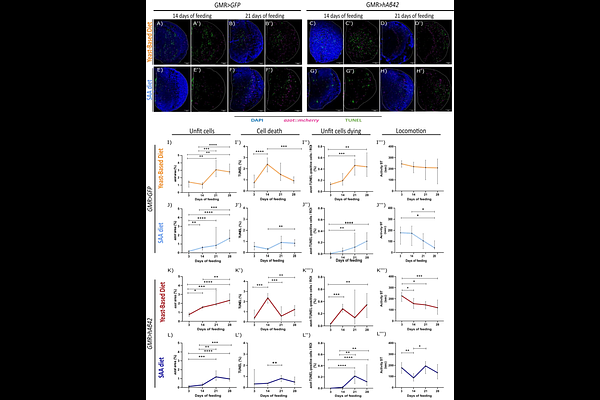Dietary Interventions Modulate Cell Competition and Locomotor Decline in an Alzheimer's Disease Drosophila Model

Dietary Interventions Modulate Cell Competition and Locomotor Decline in an Alzheimer's Disease Drosophila Model
Costa-Rodrigues, C.; Jacobs, J. R.; Couceiro, J.; Bras-Pereira, C.; Moreno, E.
AbstractAlzheimer\'s Disease (AD) is a neurodegenerative disorder characterised by the accumulation of Amyloid-beta 42 (A{beta}42) plaques and cognitive decline. Using Drosophila models, we investigated the impact of diet on cell competition, a process that eliminates unfit cells and is involved in AD progression. Cell competition is present in AD flies, where unfit neurons express fweLoseB and azot, leading to their elimination and motor improvements. In this study, we fed AD and control (healthy) flies with either a yeast-based diet (YBD) or a synthetic diet (SAA) for up to 28 days and evaluated cell competition at the cellular level and locomotion as behavioural output. AD flies fed with YBD exhibited a peak of cell competition at day 14 of feeding, being cyclical over time and followed by a progressive locomotion decline. In contrast, the SAA diet delayed the activation of cell competition until day 21, coinciding with locomotion restoration. Moreover, the synthetic diet postponed A{beta} formation, suggesting a slower progression of AD. Overexpression of the human Flower (hFWE) isoforms in Drosophila photoreceptors revealed their conserved function in regulating cell competition, with hFWE1 identified as the sole loser isoform in neuronal context. Conversely, hFWE2, a winner isoform, induced higher levels of cell competition in a diet-dependent manner. hFWE3 and hFWE4 induced a milder effect on cell competition but also have a winner-like function. In YBD-fed AD flies, hFWE2 failed to promote efficient elimination of unfit cells over time, as these flies exhibited even worse locomotion decline than control flies without hFWE2. In contrast with SAA, expression of hFWE2 induced better locomotion outcomes. Our data seems to indicate that diet may regulate AD progression through cell competition regulation, highlighting the complex interplay between diet, cell competition, and AD progression and providing insights into potential therapeutic strategies.